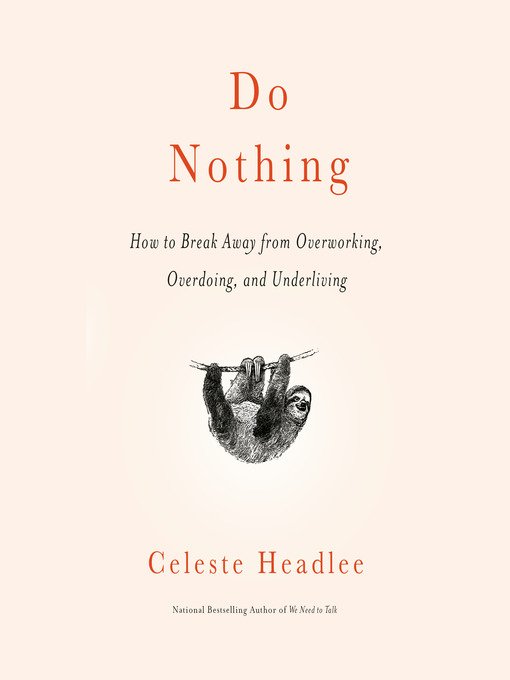Book Review: Do Nothing by Celeste Headlee
Do Nothing is a succinct, clear, well-articulated argument against productivity for productivity's sake and in favor of restructuring our individual lives and our broader society to prize connection, leisure, and kindness above hustle, grind, and perfection.
The author spends the first part of the book identifying and describing the shape, history, and manifestations of our problematic individual relationships with work and productivity culture. While some of us (like me) really love to get into the weeds on history, I think Headlee struck the right balance between breadth and depth; this is meant to be a short and helpful handbook, not an exhaustive dissertation.
To that end, the second half of the book is full of simple, practical advice that just about anyone could adopt into their own lives to establish healthy separation between work and leisure. The author notes that people who are scraping by with multiple jobs or otherwise under dire straits may not be able to do much with some of her advice; she empathizes based on her years of living paycheck-to-paycheck, though I felt the acute absence of commentary here on class and precariousness. Either way, I want to emphasize that the advice she gives is really great: easy to grasp, logical, and easy to implement. I've followed some of these tenets in my own life and I plan to work through the rest going forward.
I've spent the past few years fascinated by work and our relationship to it. To that end, I've read a lot of books and essays on the topic to get a broader sense of how other people relate to and interpret our cultural obsession with productivity and working hard. I've read books by anarchists, socialists, and capitalists, and each inevitably builds toward sort of broader, prescriptive philosophical argument (often with some fire and vitriol, which — I'll be honest — is often pretty exciting).
It was surprising, then, to see how muted the author's conclusion was. She avoids making any sweeping judgments or prescribing any broader societal actions or movements to dismantle our toxic work culture. To a frustrated leftist, I felt a bit like I was left hanging on a metaphorical high-five, especially after vibing pretty hard with everything up to that point. But then I thought about it a bit, and I realized that her careful and restrained framing makes sense.
I assume the author wanted to avoid being branded as "political." And honestly, for a book like this, that's probably the right move. This is the first book I've ever encountered about the toxicity of our work culture that I'd feel confident giving to both the liberals and conservatives in my family without reservation. I imagine it could function as a bit of a Trojan Horse for starting a conversation about the real harm that modern capitalism and cultural obsessions with individual exceptionalism have done to us. The author's conclusion does make some (to me, quite modest and reasonable) arguments that would likely be branded as "radical" in the mass media, but they're well-supported by the first 90% of the book's focus on how individuals can best adapt to an inescapable culture that diminishes the things we need to thrive as humans. The conclusion does briefly pull back from the close-up on the individual to reveal the larger machinations that keep us trapped within boxes of negative ideology and limited opportunity, but it leaves it up to us to decide what to do with it.
One thing my friends and I often disagree on, broadly speaking, is how we get from individuals suffering under an unjust system to individuals thriving under a just one. I acknowledge the injustices of our system and the deep inequalities of power and influence that exist under it, but I disagree with the assertion — often made from an exhausted, somewhat defeatist perspective — that there needs to be some "mass movement" (whose origin, composition, and fuel are never elaborated upon) to achieve a better world, and thus, individual actions are futile in getting us there. I see this argument as reflecting a misunderstanding both of the relationship between the individual and the group and of the path of an idea from vague feeling to refined ideology. We are all individual people, and we all experience feelings and thoughts all the time. It's true that, in isolation, we can't make much of an impact on the broader world — and in fact, the book articulates this quite clearly. I agree with the author, then, that finding community and connecting with others — friends, confidants, neighbors, and so on — is vital to our individual health and the health of our society. A mass movement is nothing but many individual people who have connected and built trust and mutual understanding; this book, accordingly, gives us the tools to explore a different path for ourselves that is necessarily rooted in connection to others.
We're not going to work fewer hours and spend more time contemplating and indulging our curiosities by asking our bosses for it; we're going to get there by each of us understanding our relationship to this toxic work culture and the ways we've been shaped by it, and crucially, by connecting directly with others to understand our shared struggle to reclaim our human needs in a world that's obsessed with squeezing productivity out of us at all costs.
At least, that's what I think. And now that I've read this book, I know I'm not alone in that.
